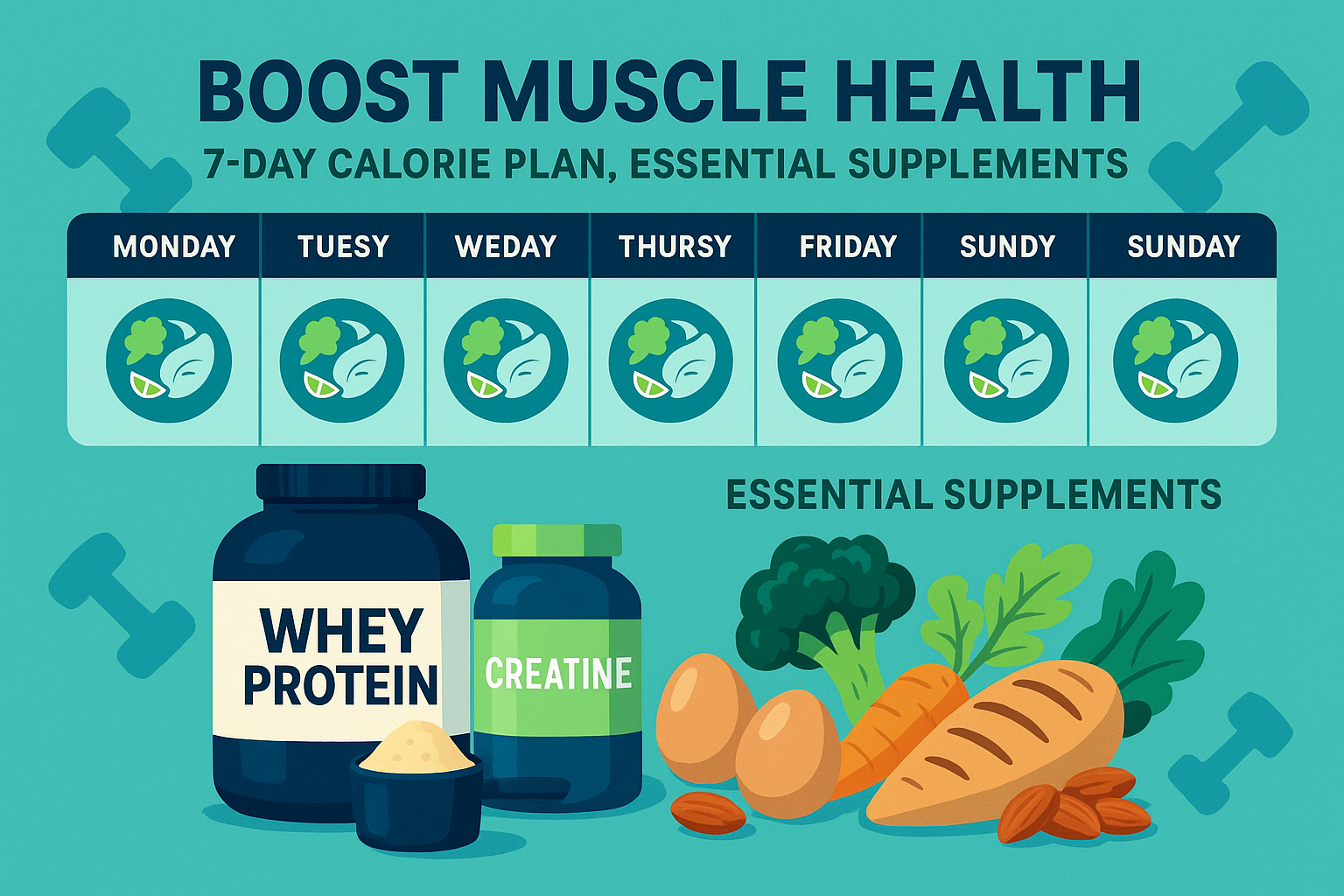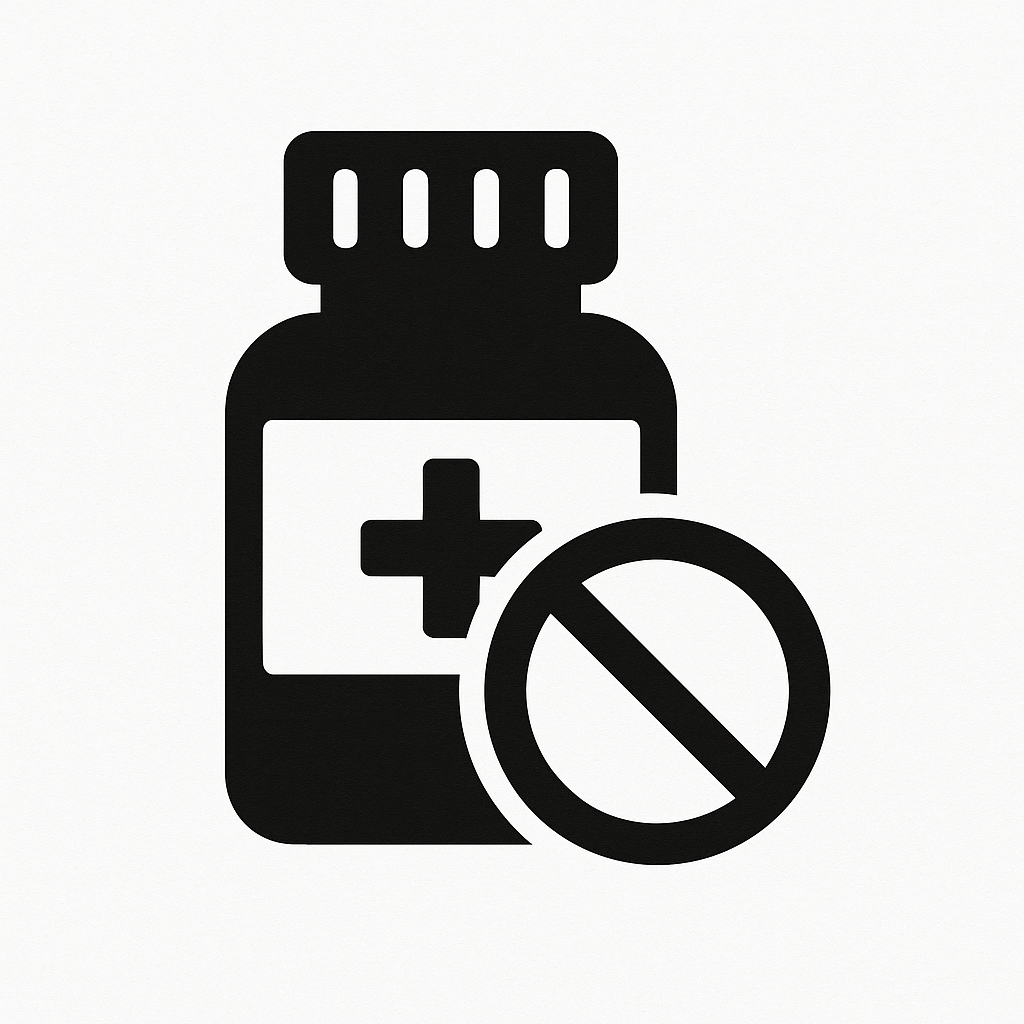
Boost Muscle Health: 7-Day Calorie Plan, Essential Supplements
Muscle health extends far beyond aesthetics and gym performance. Your muscles serve as metabolic powerhouses, supporting everyday movement, protecting joints, regulating blood sugar, maintaining bone density, and determining your body's metabolic rate. Whether you're an athlete pursuing peak performance, someone looking to build strength, or simply aiming to maintain healthy muscle mass as you age, understanding the interplay between nutrition, calorie management, and supplementation is essential.
The challenge many face is navigating conflicting information about optimal eating patterns, calorie requirements, and which supplements actually deliver results versus marketing hype. This comprehensive guide cuts through the confusion with evidence-based recommendations, a practical 7-day meal plan, and insights into supplements that genuinely support muscle health.
By the end of this article, you'll have a clear roadmap for nourishing your muscles optimally, understanding your caloric needs, and selecting supplements that complement your training and lifestyle.
The Science of Muscle Health and Nutrition
Understanding how muscles respond to nutrition creates the foundation for effective dietary strategies.
Muscle Protein Synthesis: The Growth Mechanism
Muscle growth occurs through a process called muscle protein synthesis (MPS), where your body builds new muscle proteins to repair and strengthen muscle fibers. This process is stimulated by resistance training and supported by adequate protein intake. Research demonstrates that consuming protein triggers MPS, with amino acids—particularly leucine—acting as signaling molecules that activate the muscle-building pathways.
The balance between muscle protein synthesis and muscle protein breakdown determines whether you gain, maintain, or lose muscle mass. Optimal nutrition tips this balance in favor of synthesis, creating the conditions for muscle growth and preservation.
Caloric Requirements for Muscle Health
Your caloric needs depend on your specific goals, activity level, and current body composition. Understanding these requirements prevents the common pitfalls of undereating (which compromises muscle growth and recovery) or overeating (which leads to excessive fat gain).
For muscle growth (bulking), you need a caloric surplus of approximately 250-500 calories above maintenance. This surplus provides energy for intense training and supplies building blocks for new muscle tissue. Studies show that modest surpluses optimize muscle gain while minimizing fat accumulation.
For muscle maintenance during weight loss or maintenance phases, eating at your maintenance level—typically 14-16 calories per pound of body weight for active individuals—preserves muscle mass. High protein intake becomes particularly crucial during caloric deficits to protect against muscle breakdown.
For muscle preservation during fat loss, a moderate deficit of 300-500 calories below maintenance, combined with adequate protein (0.8-1 gram per pound of body weight) and continued resistance training, maintains muscle while losing fat.
Macronutrient Foundations for Muscle Health
Each macronutrient plays distinct and essential roles in muscle health, making balanced intake crucial.
Protein: The Muscle Builder
Protein provides amino acids that serve as building blocks for muscle tissue. Research consistently demonstrates that adequate protein intake is essential for muscle growth and repair. A meta-analysis published in the British Journal of Sports Medicine found that protein supplementation significantly enhances muscle strength and size gains when combined with resistance training.
Optimal protein intake for muscle health ranges from 0.7-1 gram per pound of body weight daily, depending on training intensity, goals, and caloric intake. During caloric deficits, higher protein intake (1-1.2 grams per pound) helps preserve muscle mass.
Protein distribution matters as much as total intake. Spreading protein across 4-5 meals, with 25-40 grams per meal, optimizes muscle protein synthesis throughout the day. Each meal should contain complete proteins providing all essential amino acids.
Quality protein sources include lean meats like chicken, turkey, and lean beef; fish and seafood rich in omega-3s; eggs, the gold standard for protein quality; Greek yogurt and cottage cheese; legumes including lentils, chickpeas, and black beans; and plant-based options like tofu, tempeh, and edamame.
Carbohydrates: The Energy Provider
Carbohydrates fuel high-intensity training and replenish muscle glycogen stores—the primary energy source for resistance exercise. Research in the Journal of Applied Physiology demonstrates that adequate carbohydrate intake supports training performance and muscle recovery.
For active individuals focused on muscle health, carbohydrate intake should range from 2-4 grams per pound of body weight daily, depending on training volume. Higher training demands require more carbohydrates to maintain performance and recovery.
Complex carbohydrates provide sustained energy without blood sugar spikes. Prioritize whole grains like oats, brown rice, and quinoa; starchy vegetables including sweet potatoes, regular potatoes, and squash; fruits offering fiber and micronutrients; and legumes providing both carbohydrates and protein.
Timing carbohydrate intake around workouts optimizes performance and recovery. Pre-workout carbohydrates fuel training intensity, while post-workout carbohydrates replenish glycogen and support recovery processes.
Healthy Fats: The Hormone Regulators
Dietary fats support hormone production, including testosterone and growth hormone—both crucial for muscle health. Research published in the Journal of the International Society of Sports Nutrition shows that adequate fat intake supports optimal hormone levels in athletes.
Fat intake should comprise 20-35% of total calories, with emphasis on unsaturated fats. Essential fatty acids, particularly omega-3s, reduce inflammation and support recovery. Quality fat sources include avocados, nuts and seeds (almonds, walnuts, chia, flax), olive oil and avocado oil, fatty fish like salmon and mackerel, nut butters, and coconut oil in moderation.
Your 7-Day Muscle-Building Calorie Plan
This plan provides approximately 2,800 calories daily, with a macronutrient split of 40% carbohydrates, 30% protein, and 30% fat—ideal for active individuals seeking muscle growth. Adjust portions based on your specific caloric needs and goals.
Day 1: Foundation Day
Breakfast (650 calories): 3 whole eggs scrambled with spinach and bell peppers, 2 slices whole grain toast with almond butter, 1 medium banana, and black coffee or green tea.
Mid-Morning Snack (300 calories): Greek yogurt (plain, full-fat) with mixed berries and a tablespoon of honey.
Lunch (750 calories): Grilled chicken breast (6 oz) over quinoa (1 cup cooked) with roasted vegetables (broccoli, carrots, zucchini), drizzled with olive oil and balsamic vinegar.
Afternoon Snack (350 calories): Protein smoothie with whey protein powder, banana, spinach, almond milk, and tablespoon of peanut butter.
Dinner (650 calories): Baked salmon (6 oz) with sweet potato (medium) and steamed asparagus, side salad with mixed greens and olive oil dressing.
Evening Snack (100 calories): Small handful of mixed nuts.
Day 2: Power Day
Breakfast (700 calories): Oatmeal (1 cup cooked) with protein powder mixed in, topped with sliced banana, walnuts, and cinnamon.
Mid-Morning Snack (250 calories): Apple slices with 2 tablespoons natural peanut butter.
Lunch (800 calories): Lean ground beef (6 oz) with brown rice (1 cup cooked), black beans, salsa, and avocado—burrito bowl style.
Afternoon Snack (300 calories): Cottage cheese (1 cup) with pineapple chunks and a sprinkle of flaxseeds.
Dinner (650 calories): Grilled chicken thighs (6 oz) with roasted Brussels sprouts and fingerling potatoes tossed in olive oil.
Evening Snack (100 calories): Protein shake with water or almond milk.
Day 3: Recovery Day
Breakfast (650 calories): Whole grain pancakes (3 medium) topped with Greek yogurt, mixed berries, and maple syrup, plus 2 turkey sausage links.
Mid-Morning Snack (300 calories): Trail mix with nuts, seeds, and dried fruit.
Lunch (750 calories): Turkey and avocado wrap on whole grain tortilla with hummus, lettuce, tomato, and cucumber, plus a side of vegetable soup.
Afternoon Snack (350 calories): Protein bar (quality brand with minimal additives) and a medium orange.
Dinner (650 calories): Baked cod (6 oz) with wild rice (1 cup cooked) and sautéed kale with garlic in olive oil.
Evening Snack (100 calories): Celery sticks with almond butter.
Day 4: Strength Day
Breakfast (700 calories): Breakfast burrito with scrambled eggs (3), black beans, cheese, salsa, and avocado in a whole grain tortilla.
Mid-Morning Snack (250 calories): Protein smoothie with berries, spinach, and almond milk.
Lunch (800 calories): Grilled steak (6 oz) with baked potato topped with Greek yogurt and chives, plus steamed broccoli.
Afternoon Snack (300 calories): Rice cakes with cashew butter and sliced banana.
Dinner (650 calories): Lemon herb chicken breast (6 oz) with couscous and roasted Mediterranean vegetables (eggplant, tomatoes, bell peppers).
Evening Snack (100 calories): Handful of almonds.
Day 5: Endurance Day
Breakfast (650 calories): Protein-packed French toast (2 slices whole grain bread dipped in eggs and protein powder) topped with berries and Greek yogurt.
Mid-Morning Snack (300 calories): Banana with 2 tablespoons almond butter.
Lunch (750 calories): Tuna salad (6 oz tuna) on whole grain bread with avocado, lettuce, tomato, plus side of sweet potato fries.
Afternoon Snack (350 calories): Smoothie bowl with protein powder, mixed berries, banana, topped with granola and chia seeds.
Dinner (650 calories): Pork tenderloin (6 oz) with quinoa pilaf and green beans almondine.
Evening Snack (100 calories): Small portion of dark chocolate (70% cocoa or higher).
Day 6: Active Recovery Day
Breakfast (700 calories): Veggie and cheese omelet (3 eggs) with whole grain toast and avocado slices, plus fresh fruit salad.
Mid-Morning Snack (250 calories): Greek yogurt with honey and walnuts.
Lunch (800 calories): Chicken and vegetable stir-fry with brown rice, using variety of colorful vegetables and sesame oil.
Afternoon Snack (300 calories): Protein shake with banana and tablespoon of peanut butter.
Dinner (650 calories): Grilled shrimp (6 oz) with angel hair pasta (whole grain) in olive oil and garlic, side of mixed green salad.
Evening Snack (100 calories): Air-popped popcorn (3 cups).
Day 7: Preparation Day
Breakfast (650 calories): Breakfast hash with diced potatoes, bell peppers, onions, topped with 2 fried eggs and avocado slices.
Mid-Morning Snack (300 calories): Protein pancakes (made with protein powder, oats, and banana).
Lunch (750 calories): Grilled chicken breast (6 oz) wrap with hummus, mixed greens, tomato, cucumber, and tahini sauce.
Afternoon Snack (350 calories): Cottage cheese (1 cup) with sliced peaches and almonds.
Dinner (650 calories): Beef and vegetable kebabs with wild rice and tzatziki sauce on the side.
Evening Snack (100 calories): Casein protein shake before bed for overnight muscle recovery.
Meal Plan Notes and Customization
Hydration is crucial—drink at least 8-10 glasses of water daily, more on training days. Adjust portion sizes based on your specific caloric needs; this plan serves as a template. Timing meals around workouts optimizes performance and recovery. Prepare meals in advance for consistency and convenience. Include variety by rotating protein sources, vegetables, and whole grains throughout the week.
Essential Supplements for Muscle Health
While whole foods should form your nutritional foundation, targeted supplementation can support muscle health, performance, and recovery.
Protein Powder: Convenience and Quality
Protein powder offers convenient, high-quality protein to help meet daily requirements. Whey protein is rapidly absorbed, making it ideal post-workout for quick amino acid delivery. Research consistently shows whey protein effectively supports muscle protein synthesis and recovery.
Casein protein digests slowly, providing sustained amino acid release—ideal before bed to support overnight muscle recovery. Plant-based proteins (pea, rice, hemp blends) offer complete amino acid profiles for those avoiding dairy. Look for products with minimal additives, third-party testing, and at least 20-25 grams protein per serving.
Creatine Monohydrate: The Performance Enhancer
Creatine monohydrate stands as one of the most researched and effective supplements for muscle health. It increases phosphocreatine stores in muscles, supporting ATP production—the primary energy currency for high-intensity exercise.
Research demonstrates that creatine supplementation increases strength, power output, muscle mass, and exercise performance. The standard dosing protocol is 5 grams daily, taken consistently regardless of training schedule. Creatine is safe for long-term use in healthy individuals.
Branched-Chain Amino Acids (BCAAs): Recovery Support
BCAAs—leucine, isoleucine, and valine—are essential amino acids that support muscle protein synthesis and reduce muscle breakdown during training. While whole proteins provide BCAAs, supplemental BCAAs can benefit training in fasted states or during prolonged exercise.
Research suggests BCAAs may reduce exercise-induced muscle damage and soreness, though their benefits are most pronounced when overall protein intake is suboptimal. For those consuming adequate protein from whole foods, BCAAs are less essential but can support specific training scenarios.
Beta-Alanine: Endurance Booster
Beta-alanine increases muscle carnosine levels, which buffers acid buildup during high-intensity exercise. This allows you to train harder and longer before fatigue sets in. Studies show beta-alanine improves performance in exercises lasting 1-4 minutes and supports muscle endurance.
Standard dosing is 4-6 grams daily, split into smaller doses to minimize the harmless tingling sensation some users experience. Benefits accumulate over 2-4 weeks of consistent supplementation.
Omega-3 Fatty Acids: Anti-Inflammatory Support
Omega-3s (EPA and DHA) from fish oil reduce inflammation, support cardiovascular health, and may enhance muscle protein synthesis and recovery. Research published in the American Journal of Clinical Nutrition suggests omega-3 supplementation can augment muscle protein synthesis responses to amino acid and insulin stimulation.
Aim for 2-3 grams combined EPA and DHA daily from quality fish oil or algae-based supplements. Choose products tested for purity and free from contaminants.
Vitamin D: The Muscle Function Supporter
Vitamin D plays crucial roles in muscle function, strength, and recovery. Deficiency is common and correlates with reduced muscle strength and increased injury risk. Research shows vitamin D supplementation in deficient individuals improves muscle function and may enhance testosterone levels in men.
Have your levels tested and supplement accordingly—many people need 2,000-5,000 IU daily to achieve optimal levels (40-60 ng/mL). Vitamin D3 (cholecalciferol) is the preferred form.
Magnesium: The Recovery Mineral
Magnesium supports muscle relaxation, sleep quality, and energy production—all crucial for recovery and muscle health. Many athletes are deficient due to losses through sweat and increased demands from training. Magnesium glycinate or citrate forms are well-absorbed and less likely to cause digestive upset.
Dosing ranges from 300-500mg daily, ideally in the evening to support sleep quality.
Greens and Superfoods: Micronutrient Insurance
While not directly muscle-building, greens powders and superfood supplements provide concentrated micronutrients, antioxidants, and phytonutrients that support overall health, recovery, and inflammation management. These products help fill nutritional gaps when whole food vegetable intake is insufficient.
Quality greens supplements contain spirulina, chlorella, wheatgrass, vegetable extracts, and adaptogenic herbs. Choose products with organic ingredients and minimal fillers or sweeteners.
The Role of Intra-Workout Nutrition
Intra-workout supplementation—nutrition consumed during training—can support performance and recovery, particularly during intense or prolonged training sessions.
When Intra-Workout Nutrition Matters
For training sessions longer than 60-90 minutes, high-volume resistance training with short rest periods, or training in hot environments with significant sweat loss, intra-workout nutrition becomes increasingly valuable.
Key Intra-Workout Nutrients
Carbohydrates during extended training maintain blood glucose, spare muscle glycogen, and support performance. Fast-digesting carbohydrates like dextrose or cluster dextrin are ideal, with 30-60 grams per hour for sessions exceeding 90 minutes.
Electrolytes (sodium, potassium, magnesium) replace minerals lost through sweat and maintain hydration and muscle function. This is particularly important in hot conditions or for heavy sweaters.
Essential amino acids or BCAAs during training may reduce muscle breakdown and support recovery, though benefits are most apparent when training fasted or when overall protein intake is suboptimal.
Lifestyle Factors Supporting Muscle Health
Nutrition and supplementation work synergistically with other lifestyle factors to optimize muscle health.
Sleep: The Underrated Muscle Builder
Sleep is when your body performs most muscle repair and growth. Research published in the Journal of Science and Medicine in Sport demonstrates that sleep deprivation impairs muscle recovery and reduces muscle protein synthesis. Aim for 7-9 hours of quality sleep nightly. Prioritize consistent sleep-wake times, cool and dark sleeping environment, limiting screen time before bed, and considering casein protein before sleep to support overnight recovery.
Resistance Training: The Stimulus
Exercise provides the stimulus that triggers muscle adaptation. Research in Medicine and Science in Sports and Exercise shows that resistance training is essential for maintaining and building muscle mass. Progressive overload—gradually increasing training stress—drives continued adaptation. Include compound movements (squats, deadlifts, presses, rows), adequate training volume (10-20 sets per muscle group weekly), sufficient intensity (challenging loads), and appropriate recovery between sessions.
Stress Management: Protecting Your Gains
Chronic stress elevates cortisol, which promotes muscle breakdown and can interfere with recovery and growth. Managing stress through meditation or mindfulness, adequate rest days, social connections, and enjoyable activities protects your muscle-building efforts.
Hydration: The Forgotten Essential
Water supports nutrient delivery, waste removal, temperature regulation, and muscle function. Even mild dehydration impairs strength and endurance. Drink at least half your body weight in ounces daily, more on training days. Monitor urine color—pale yellow indicates adequate hydration.
Monitoring Progress and Adjusting Your Plan
Tracking progress allows you to make informed adjustments to your nutrition and training.
Metrics to Monitor
Body weight trends (weekly averages, not daily fluctuations), body composition changes (measurements, photos, how clothes fit), strength progression (weights lifted, reps completed), performance markers (endurance, recovery time), and energy levels and recovery quality provide valuable feedback.
When to Adjust
If weight isn't changing as expected (gain for bulking, maintenance for preservation), adjust calories by 200-300 in the appropriate direction. If strength isn't increasing over several weeks, evaluate training program, caloric intake, and recovery quality. If experiencing persistent fatigue, consider increasing calories, improving sleep quality, or reducing training volume.
Putting It All Together
Building and maintaining muscle health requires a comprehensive approach integrating strategic nutrition, appropriate caloric intake, evidence-based supplementation, consistent training, and adequate recovery. The 7-day meal plan provides a practical framework for fueling your muscles optimally, while understanding supplementation helps you make informed choices about products that genuinely support your goals.
Remember that consistency trumps perfection. Following this plan most of the time while allowing flexibility for life's demands creates sustainable results. Your muscle-building journey is marathon, not a sprint—focus on building habits and systems that support long-term success.
Fuel Your Muscle-Building Journey
Optimizing muscle health requires not just knowledge but also access to quality supplements that support your training and recovery. Whether you need intra-workout nutrition to fuel intense training sessions, comprehensive sports care support for recovery and performance, or greens and superfoods to ensure complete micronutrient coverage, choosing evidence-based products makes a meaningful difference.
Explore scientifically-formulated supplements designed to support every aspect of your muscle health journey:
- Intra-Workout Supplements for sustained energy and performance during training
- Sports Care Products for comprehensive recovery and injury prevention support
- Greens & Superfoods for complete micronutrient support and overall health
Your muscles deserve the best fuel and support. Take the next step toward optimal muscle health today.
Disclaimer: This article is intended for informational and educational purposes only and should not be construed as medical advice, diagnosis, or treatment recommendations. The information provided about muscle health, nutrition, calorie planning, exercise, and supplementation is based on general health principles and available research, but individual needs vary significantly based on age, health status, fitness level, medications, and underlying medical conditions. Always consult with qualified healthcare professionals, including your physician, registered dietitian, or certified sports nutritionist, before starting any new nutrition plan, supplement regimen, or exercise program, particularly if you have preexisting medical conditions such as cardiovascular disease, diabetes, kidney disease, or metabolic disorders, take prescription medications, have a history of eating disorders, or are pregnant or breastfeeding. The 7-day meal plan provided is a general template that may not be appropriate for everyone and should be adjusted based on individual caloric needs, dietary restrictions, allergies, and personal preferences. Caloric requirements vary widely based on factors including age, sex, body composition, activity level, and metabolic rate—the calorie levels suggested may be too high or too low for your specific situation. The statements about supplements, their effects, and benefits have not been evaluated by the Food and Drug Administration, and products mentioned are not intended to diagnose, treat, cure, or prevent any disease. Supplements can interact with medications and may not be appropriate for everyone, particularly those with certain medical conditions. Before taking any supplements, discuss them with your healthcare provider. This article cannot replace personalized nutritional guidance and medical supervision from qualified professionals who can evaluate your individual circumstances and provide recommendations tailored to your specific health profile, goals, and needs.
Share








